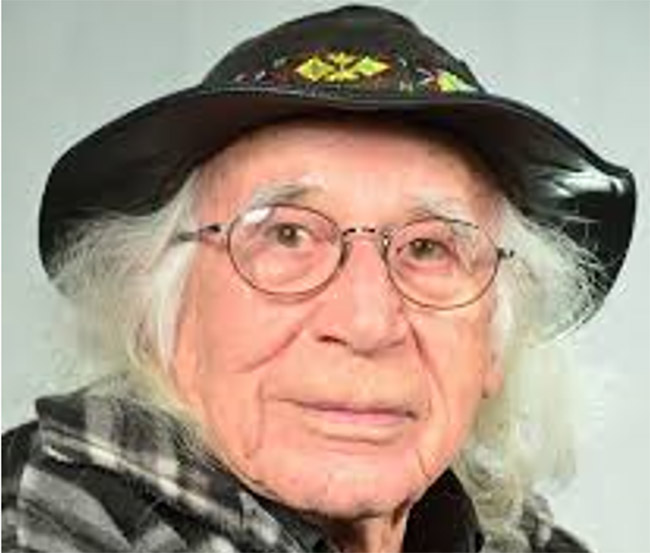Wilmer Nadjiwan, founding member of the Union of Ontario Indians, passes into the Spirit World

By Laura Robinson
Despite snow squalls delivered by the waters that Chief Wilmer Nadjiwon loved to fish in for decades, hundreds gathered at the Chippewa of Nawash Community Centre on January 6, to say goodbye to a citizen who was at the vanguard of justice for First Nations people. While the furnace at the Centre didn’t want to cooperate, warmth spread as hundreds remembered and honoured Chief Nadjiwon, who founded the Union of Ontario Indians in 1964. He was also chief of Nawash at that time, spanning 14 years—a time he rid the community of the Indian Agent.
“Chief Nadjiwon was ahead of his time,” said Anishinabek Nation Grand Council Chief Patrick Madahbee. “His political savvy was so insightful. I remember him talking about politics and strategies that would match any Prime Minister. We lose a great Warrior.”
Band Councilor Tony Chegahno, who officiated, echoed the Grand Chief’s sentiments. “What we leave behind is what’s going to be judged in the future,” he said, referring to the legacy Chief Nadjiwon gave his community and First Nations people. Chief Greg Nadjiwon, Nawash’s current chief and nephew to the senior Nadjiwon, delivered the eulogy. “He was determined to move the bar on the rights of Aboriginal people,” said Chief Nadjiwon. “One of the people remember how he removed the Indian Agent. They remember my uncle pulling up beside the Indian Agent and saying ‘You’re the Indian Agent and I’m the Chief. There isn’t enough room for both of us’.”
“He fought the good fight,” noted Chief Nadjiwon. “Like so many of his relatives, residential school was something he survived but it left its mark on him. He recognized it robbed him of the capacity to be a loving parent….living the residential school experience allowed him to see how [people suffered] but he acknowledged his pain.”
In 2012 the senior Nadjiwon published his book, “Not Wolf Nor Dog: An Ojbiway Elder’s tales of residential school, wartime service, First Nation politics and some experiences with the Great Spirit” https://tobermorypress.wordpress.com/books-for-sale/ He was soon a most sought-after speaker, never mincing words about the devastating effect every kind of abuse imaginable had on him and the other children forced to endure that long, horrible chapter of history called residential school. Chief Nadjiwon’s acclaimed carvings include a powerful tableau of a priest, a boy and a door. Just as he was able to condense into one life what could have taken many lives to achieve, so his carvings and art spoke with wisdom, simplicity and underlying stories about humanity, creation, love and pain.
Chief Nadjiwon was born June 15, 1921 at Neyaashiinigmiing and passed to the Spirit World on January 3 2018, also at Neyasshiinigmiing, age 96. Over his life he was a fisherman, hunter, painter, renowned carver, politician, activist and author. He was the last WWII veteran in the community who had seen combat. In his eulogy, his nephew noted, “He had a willingness to take his life seriously. In World War II he realized, despite the emotional and physical hardship, he was accepted and respected as another warrior.” Like so many other war veterans, Wilmer Nadjiwon returned to a place where he was not allowed to vote, lived on a tiny portion of the land his ancestors once thrived on, and had his childhood, language and culture robbed from him through colonial practices, which included residential schools and a community divided by sectarian Christianity. He never stopped being a warrior when he returned home, and speaker after speaker noted his love of debate.
Chegahno talked about how often Chief Nadjiwon would say: “I guarantee you this will work. Learn to trust. Learn to walk together.” Cape Croker Park, which became a much sought-after camping and recreation destination, through which the Bruce Trail traverses, was one enterprise he created. But then Chegahno added, “If you wanted to spend four hours with him, just say, ‘No, I don’t think that will work.’ He’ll spend the next four hours arguing with you.”
Elder Berdina Johnston, who said the closing prayer, spoke about her friend and colleague of many years. “When I was in university in Toronto, he was there at his new office.” Johnston visited whenever she could. The environment was intellectually lively, and a new chapter was being written in terms of First Nation people and self-determination. “We’d be licking stamps, whatever we needed to do, that’s what we did there. One-day Wilmer said he’d had a disagreement with the Minister of Social Affairs. ‘We need to do a protest march’ on Queen’s Park he said.” Johnston paused and added proudly, “That which we did do.”
Expressions of remembrance to the Maadookii Senior Centre are appreciated. Messages of condolence at: www.georgefuneralhome.com


